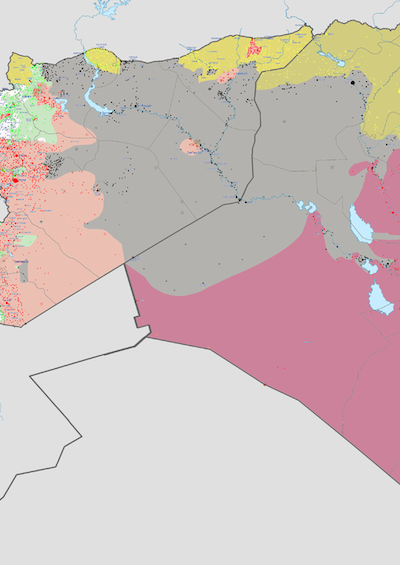Rethinking the U.S. Strategy Against IS in Syria
Why the U.S. government should use mercenaries in Syria.
May 26, 2015

For its strategy on Islamic State (IS) to work, the United States has to sacrifice what was long considered a sacred cow — the integrity of Iraq. But success in that endeavor requires the sacrifice of another sacred cow – the supposed U.S. reluctance to recruit mercenaries.
The Bush Administration was willing to outsource logistics to private companies. Indeed, it was adamant about doing so, despite the self-inflicted damage many thought would result.
The U.S. Strategy on IS in Iraq Has It Backwards
Why the U.S. government must rethink Iraq’s territorial integrity.
Some worried that the extensive use of Halliburton, a firm over which the then Vice President Dick Cheney had presided, would reek of corruption and undermine the strategic and moral case (such as it was) for war.
Others worried that private security firms like Blackwater had no margin for error and risked failing in their mission, harming innocent bystanders, or both. The predictions held up.
Conversely, the Bush Administration was not willing to pay for locally sourced mercenaries in a region well accustomed to the use of proxies and hired guns.
This was a surprising choice, given that the mere presence of U.S. citizens, corporate or otherwise, always helps extremists find recruits to their cause.
No choice in Syria
In Syria, however, the United States has no realistic alternative that it should be willing to accept. It becomes especially important to defeat the Islamic State in Syria if it is unrealistic – as the first part of this article argued – to defeat IS in Iraq.
The Islamic State practices its barbarism outside of its home bases in Iraq to extract resources to defeat the Iraqi Army in Baghdad. It will be a destabilizing force in Iraq, as long as it can extract those resources from Syria.
And it will practice atrocities within Syria as long as that is the cheapest way to recruit, keep order and repress rebellion on alien turf.
The use of U.S. ground forces – or any non-Muslim forces – risks inciting a backlash that would eventually force a calamitous withdrawal. The use of local Sunnis in the Euphrates valley and other willing Sunni mercenaries, in contrast, would make sense for the same reason. It would be hard or impossible to defeat IS military commanders on their home turf in northern Iraq.
But viable local options are few and far between. The Assad government has bombed and starved the Sunni population to the point where its home-grown rebellion has long since fragmented and is now collapsing or ceding command to foreign fighters that the United States opposes.
The use of Shia forces would be counterproductive, because it would convince Syria’s besieged Sunnis that the United States is secretly conspiring with Shia Iran.
And the only close Sunni neighbors who would have a reason to fight in Syria alongside besieged locals are from Iraq – the very people providing a formidable command and control structure to IS.
There are nevertheless two groups of non-Syrian Sunnis with motivations of their own to resist the (literal) dismemberment of Syria.
Sunni Chechens are dismayed at the support their cynical government in Moscow has given to the genocidal campaign of the Assad government in Syria against its Sunni majority. Many would jump at the opportunity to staunch the bloodshed with the U.S. Air Force at their back.
Conservative Sunnis from the poorer parts of Saudi Arabia are dismayed at the support their government gave to Egypt’s secular counter-revolution. The coup in Egypt crushed hope in the Middle East, even as it crushed the Muslim Brotherhood, which speaks in whispers for many in Saudi Arabia who are not princelings of the royal family.
Three advantages
Hiring a mercenary ground force of Chechens and Saudis to roll IS up the Euphrates Valley from the Iraqi border through Deir ez-Zor and Raqqa to Aleppo would have three clear-cut advantages:
1. It would remove a mostly alien occupying force from a region of Sunnis who have suffered almost as much under the Assads as the Shia of southern Iraq suffered under Saddam.
2. It is militarily feasible. Significant populations in the Syrian territory occupied by IS live within a very narrow band of the river stretching from the middle of the border with Iraq to Aleppo in the northwest. They do not support the foreign jihadists. A concentrated assault starting at the Iraqi border would leave IS nowhere to go.
3. It may look at first like a disadvantage because recent history in the Middle East and North Africa shows mercenaries hired to fight away from home tend to cause trouble when they return.
But Chechens and Saudis at least have homes where they could easily blend back into society after a moderate mercenary adventure — unlike, for example, the mercenaries who helped topple Gaddafi, who had nothing better to do afterward than spread mayhem throughout the Sahel.
Strategic blowback?
It is true that many fighters would be tempted to put their new trade to use back home in Chechnya and Saudi Arabia. But it matters that Russia has contributed to the problem in Syria through its cynical support of Assad.
And it matters that Saudi Arabia has made things worse by cynically financing the coup that ended the Arab Spring in Egypt – destroying hope in the region and guaranteeing plenty of recruits for IS.
The third advantage of hiring Chechen and Saudi mercenaries to roll up the IS occupiers in Syria, in other words, is that cynicism should have consequences.
In sum, the United States should reverse itself, focusing on containment of IS forces in the parts of Iraq where many of them were born and hiring mercenaries to eradicate IS in Syria.
The resulting partition of Iraq, as argued in the first part of this article, will stabilize the region by reducing conflict within the country’s old borders and providing a counterweight to Iran.
And the careful selection of mercenaries to end the IS occupation of Syria could turn blowback in appropriate directions.
Takeaways
The US should focus on containment of IS forces in Iraq and hire mercenaries to eradicate IS in Syria.
The US should hire a mercenary ground force of Chechens and Saudis to roll IS up the Euphrates Valley.
To defeat IS, the US has to sacrifice what was long considered a sacred cow -- the integrity of Iraq.

